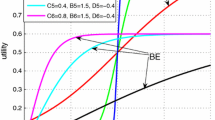Abstract
Recently optimal Carrier Sense Multiple Access (CSMA) scheduling schemes have attracted much attention in wireless networks due to their low complexity and provably optimal throughput. However, in practice, the schemes incur strong positive correlations between consecutive link schedules and let a scheduled link likely remain scheduled in the next time slot, which leads to poor delay performance. In this paper, we revise the original optimal CSMA algorithm for discrete-time systems, the Queue-length based CSMA (Q-CSMA), and substantially improve its delay performance. In our proposed algorithm, called Dual Access Probability CSMA (DAP-CSMA), each link has two state-dependent access probabilities depending on the link activity of the previous time, which allow us to accelerate the turn-off of previously scheduled links. This rapid activity transition reduces the correlation of the link service process and thereby improves the delay performance. We show that our DAP-CSMA is provably efficient and attains the optimal throughput. The simulation results demonstrate that our proposed scheduling significantly outperforms Q-CSMA in various scenarios and can be combined with a recent variant of Q-CSMA for better delay performance, Delayed-CSMA.









Similar content being viewed by others
Notes
If we add more links in the maximal link schedule, there always occur collisions.
References
Joo, C., & Kang, S. (2017). Joint scheduling of data transmission and wireless power transfer in multi-channel device-to-device networksnetworks. Journal of Communications and Networks, 19(2), 180–188.
Tassiulas, L., & Ephremides, A. (1992). Stability properties of constrained queueing systems and scheduling policies for maximum throughput in multihop radio networks. IEEE Transactions on Automatic Control, 37(12), 1936–1948.
Neely, M. J., Modiano, E., & Rohrs, C. E. (2005). Dynamic power allocation and routing for time-varying wireless networks. IEEE Journal on Selected Areas in Communications, 23(1), 89–103.
Wu, X., Srikant, R., & Perkins, J. R. (2007). Scheduling efficiency of distributed greedy scheduling algorithms in wireless networks. IEEE Transactions on Mobile Computing, 6(6), 595–605.
Modiano, E., Shah, D., & Zussman, G. (2006). Maximizing throughput in wireless networks via gossiping. In Proceedings of the ACM SIGMETRICS.
Joo, C., & Shroff, N. (2009). Performance of random access scheduling schemes in multi-hop wireless networks. IEEE/ACM Transactions on Networking, 17(5), 1481–1493.
Sanghavi, S., Bui, L., & Srikant, R. (2007). Distributed link scheduling with constant overhead. In Proceedings of the ACM SIGMETRICS.
Jiang, L., & Walrand, J. (2010). A distributed CSMA algorithm for throughput and utility maximization in wireless networks. IEEE/ACM Transactions on Networking, 18(3), 960–972.
Jiang, L., Shah, D., Shin, J., & Walrand, J. (2010). Distributed random access algorithm: Scheduling and congestion control. IEEE Transactions on Information Theory, 56(12), 6182–6207.
Rajagopalan, S., Shah, D., & Shin, J. (2009). Network adiabatic theorem: An efficient randomized protocol for contention resolution. In Proceedings of the ACM SIGMETRICS.
Ni, J., Tan, B., & Srikant, R. (2010). Q-CSMA: Queue-length based CSMA/CA algorithms for achieving maximum throughput and low delay in wireless networks. In IEEE INFOCOM.
Ghaderi, J., & Srikant, R. (2012). Effect of access probabilities on the delay performance of Q-CSMA algorithms. In IEEE INFOCOM.
Lee, C., Eun, D., Yun, S., & Yi, Y. (2012). From Glauber dynamics to Metropolis algorithm: Smaller delay in optimal CSMA. In IEEE ISIT.
Huang, P., & Lin, X. (2013). Improving the delay performance of CSMA algorithms: A virtual multi-channel approach. In IEEE INFOCOM.
Kwak, J., Lee, C., & Eun, D. (2014). A high-order Markov chain based scheduling algorithm for low delay in CSMA networks. In IEEE INFOCOM.
Wang, Y., & Xia, Y. (2013). A distributed CSMA algorithm for wireless networks based on Ising model. In IEEE GLOBECOM.
Proutiere, A., Yi, Y., Lan, T., & Chiang, M. (2010). Resource allocation over network dynamics without timescale separation. In Proceedings of the IEEE INFOCOM.
Qian, D., Zheng, D., Zhang, J., & Shroff, N. (2010). CSMA-based distributed scheduling in multi-hop MIMO networks under SINR model. In Proceedings of the IEEE INFOCOM.
Choi, J., Joo, C., Zhang, J., & Shroff, N. (2014). Distributed link scheduling under SINR model in multi-hop wireless networks. IEEE/ACM Transactions on Networking, 22(4), 1204–1217.
Yun, S., Shin, J., & Yi, Y. (2013). CSMA over time-varying channels: Optimality, uniqueness and limited backoff rate. In Proceedings of the ACM MOBIHOC.
Kim, T., Ni, J., Srikant, R., & Vaidya, N. (2011). On the achievable throughput of CSMA under imperfect carrier sensing. In Proceedings of the IEEE INFOCOM.
Jiang, L., Leconte, M., Ni, J., Srikant, R., & Walrand, J. (2012). Fast mixing of parallel glauber dynamics and low-delay CSMA scheduling. IEEE Transactions on Information Theory, 58(10), 6541–6555.
Shah, D., & Shin, J. (2010). Delay optimal queue-based CSMA. In Proceedings of the ACM SIGMETRICS.
Lotfinezhad, M., & Marbach, P. (2011). Throughput-optimal random access with order-optimal delay. In Proceedings of the IEEE INFOCOM.
Lee, D., Yun, D., Shin, J., Yi, Y., & Yun, S. (2014). Provable per-link delay-optimal CSMA for general wireless network topology. In IEEE INFOCOM.
Eryilmaz, A., Srikant, R., & Perkins, J. (2005). Stable scheduling policies for fading wireless channels. IEEE/ACM Transactions on Networking, 13(2), 411–424.
Bruneel, H. (1983). On the behavior of buffers with random server interruptions. Performance Evaluation, 3, 165–175.
Kelly, F., Maulloo, A., & Tan, D. (1998). Rate control in communication networks: Shadow prices, proportional fairness and stability. Journal of the Operational Research Society, 49, 237–252.
Choi, J., & Bahk, S. (2007). Cell throughput analysis of the proportional fair scheduler in the single cell environment. IEEE Transactions on Vehicular Technology, 56(2), 766–778.
Acknowledgements
This research was supported in part by Basic Science Research Program through the National Research Foundation of Korea (NRF) funded by the Ministry of Education (2018R1D1A1B07048948), and in part by IITP grant funded by the Korea government (MSIT) (No. 2015-0-00278, Research on Near-Zero Latency Network for 5G Immersive Service).
Author information
Authors and Affiliations
Corresponding author
Rights and permissions
About this article
Cite this article
Choi, JG., Joo, C. Optimal CSMA scheduling with dual access probability for wireless networks. Wireless Netw 25, 2101–2115 (2019). https://doi.org/10.1007/s11276-018-1800-6
Published:
Issue Date:
DOI: https://doi.org/10.1007/s11276-018-1800-6




